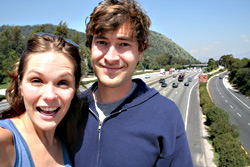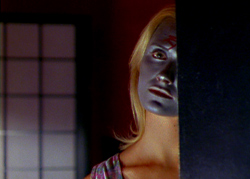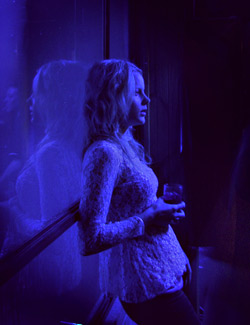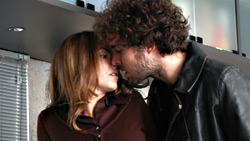A first-time feature about a failed indie rocker, his beautiful girlfriend, and his sanctimonious nature-boy brother on a road trip: There are so many ways that The Puffy Chair could have gone wrong. But it doesn’t—not once. Like Funny Ha Ha, the casually raw 2002 faux-cinéma-vérité indie about a bunch of shiftless twentysomethings, Chair uses simple, unadorned dialogue and intimate, off-the-cuff performances to get at the underlying issues. Which is to say: This is a good little movie.
The opening two scenes paint the film’s central relationship in deft strokes. Josh (Mark Duplass, who co-wrote the script with his director brother, Jay) is a confused fuck-up whose music career is dead, yet his girlfriend, Emily (Kathryn Aselton), remains loyal. When he plans a road trip to deliver a La-Z-Boy recliner to his father, Emily wants to come—no matter that their relationship is on shaky ground.
They hop into the van, the credits roll, and, somewhere south of New York but north of Virginia, the couple visits Rhett (Rhett Wilkins), Josh’s brother. This is a character whose hair says it all: nearly shaven head dramatically underscored by a dark, thick, hippie-swami beard. (How many times have you seen that at the yoga studio?) Rhett’s innocent eyes seem to want to love everything and everybody. Emily swallows it whole; next to Josh, Rhett’s warmth has the welcome softness of . . . a puffy chair. Somehow the setup works: Rhett triangulates against Josh and Emily, making quick work of stirring up their shit. It takes Emily longer than you’d like to unearth the truth about Rhett, but that’s Emily—a romantic who needs and wants to believe in love.
What’s wonderful about Chair is that each of the three principals is exposed in surprising but inevitable ways. Josh turns out to have a backbone and a sense of integrity. Emily, caught up in a fantasy of what she wants from her relationship, can’t be honest with herself about what she has. And Rhett’s woozy world of universal adoration turns out to have its limits.
The script is bold in its simplicity. It’s just three people on the road, sleeping in motels, eating junk, killing time—but it’s really about what lies beneath, the relationships behind the relationships. The Duplass brothers are adept at wringing meaning from regular life, rather than resorting to trumped-up drama. They’re great in the editing room, too. Most scenes end exactly where they should, on a complex (and enjoyably wobbly) lingering note. Chair also masters the graceful exit: Get the job done and get out. And the gorgeously rich ending—the very best thing about the film—wakes us from a dream in which we had unknowingly become complicit. It’s the first time since Before Sunset that a film’s conclusion has done so much with so little, and it augurs well for the Duplass brothers’ future. MELISSA LEVINE E








